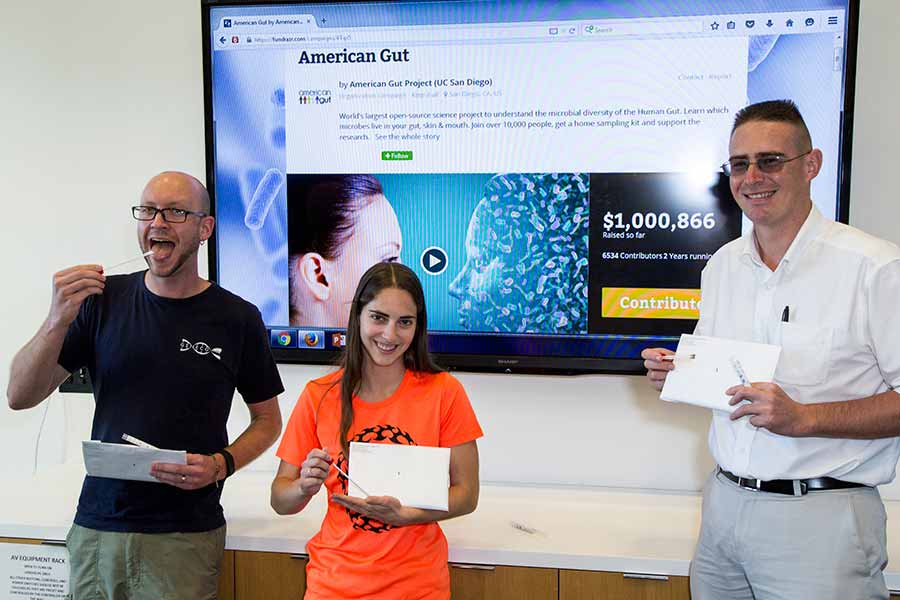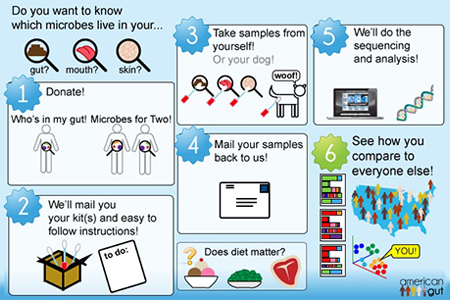By:
- Heather Buschman
Published Date
By:
- Heather Buschman
Share This:
American Gut Project Crowdfunds $1 Million to Study the Human Microbiome
Researchers at the American Gut Project, the world’s largest crowdsourced, crowdfunded science project, are celebrating a big milestone this week—in the past two years, they have raised more than $1 million from over 6,500 “citizen scientists” who have agreed to have their microbiomes sequenced.

Left to Right: Daniel McDonald, Ph.D., postdoctoral researcher and former American Gut manager, Embriette Hyde, Ph.D., postdoctoral researcher and current American Gut manager, Rob Knight, Ph.D., professor and American Gut Project co-founder. Photo by Ryan Parks
The American Gut Project was co-founded by Rob Knight, Ph.D., a professor of pediatrics and computer science and engineering at the UC San Diego School of Medicine, and is currently managed by Embriette Hyde, Ph.D., a postdoctoral researcher in his lab, performing DNA sequencing with the UC San Diego Institute for Genomic Medicine.
Anyone can contribute to and participate in the American Gut Project—it’s not too late. In fact, the goal is to sequence as many human microbiomes as possible. That means you get a kit, use it to swab your gut (er…stool, that is), mouth or skin, and mail it in. The American Gut Project team extracts the microbial DNA from the sample and uses a genetic sequencing technique to map which types of bacteria are there and how many there are of each type.
Why would anyone want to mail their poop to the American Gut Project?
Not only do American Gut participants get information about what’s living in their own bodies, they can see how they compare to other participants with similar (or different) ages, diets and exercise habits.
What’s more, participants are also contributing valuable information (stripped of their personal info, of course) to an open access database. Since the microbial data is paired with lifestyle information such as diet and exercise, researchers all over the world can use these data to study things like how exercise influences the microbiome and how that microbial makeup is associated with things like inflammatory bowel disease, cancer, even autism.
To participate, go to americangut.org.
What can we learn from the human microbiome?

So far, the American Gut Project team is finding that, in general, a healthy gut microbiome is one with a diverse number of bacterial species in it. Some of the things that are associated with a diverse gut microbiome are some of the same things you already know are good for your health, like a diet high in fiber and low in processed foods. But there are some surprises emerging, too—microbiome diversity seems to change with the seasons and even increases with the amount of sleep an individual gets each night, for example.
In the future, Knight believes a microbiome readout might help us better understand a lot about your health, risk of disease and how best to treat it, by addressing questions such as:
- What defines a “healthy” microbiome?
- How does a C-section birth affect a child’s health? Does the effect last forever?
- What’s your risk of developing inflammatory bowel disease (IBD)? (Or colon cancer or a number of other diseases linked to the gut microbiome?)
- Is there a link between the gut microbiome and autism?
- Which microbes are causing your toddler's diarrhea? What’s just the right probiotic to restore her gut to health?
- Can we tweak your microbial populations to help you lose weight?
“Our ultimate goal is to understand the fundamental principles that govern the complex microbial communities that live within us, and be able to change those communities to address some of the most important problems facing humanity today,” Knight says.
How can you get even more involved?
Many students, postdoctoral researchers, collaborators and volunteers have contributed to the success of the American Gut Project throughout the years. Beyond contributing your own funds and samples to the American Gut Project, the Knight lab always welcomes student volunteers to help pack kits and analyze data, as well as developers who can contribute their expertise.
If you are interested in volunteering to help the project, please contact Embriette Hyde at ehyde@ucsd.edu.

Salmonella
Where else can you find American Gut?
Through collaborations, the American Gut is now expanding globally through the British Gut Project and an aggregation site in Australia.
The American Gut Project will also be featured in a special active learning session at Digestive Disease Week® 2016, organized by the American Gastroenterological Association Institute’s Center for Gut Microbiome Research and Education, May 21-24 in San Diego. Participants have the opportunity to get their gut microbiomes sequenced by American Gut ahead of time, and interesting trends will be discussed at the session.
“I’m excited that the project is growing and reaching areas across the globe,” says Hyde. “The more people that are involved, the more we can learn about the microbiome and how it impacts human health.”
Share This:
You May Also Like
Stay in the Know
Keep up with all the latest from UC San Diego. Subscribe to the newsletter today.



